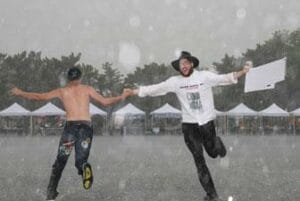IN 1968, AS SOVIET TANKS rolled into Prague, Hershel Okunov, then a young yeshiva student in Brooklyn, met with Menachem Mendel Schneerson, the Lubavitcher Rebbe.
Amid the crisis in Eastern Europe, American Jews were becoming increasingly concerned over the plight of Soviet Jewry. Refugees would won begin to pour into the United States, the Rebbe predicted. He urged the Ukrainian-born Okunov to get involved with giving them their first taste of Yiddishkeit.
Okunov soon founded the Friends of Refugees from Eastern Europe. The organization, known as FREE, seeks out immigrants from Soviet-bloc countries who, for most of their lives, were denied access I to Jewish education and ritual practice and subjected to Communist and-religious propaganda campaigns.
In the last 20 years, FREE, which today has a full-time staff of 30, has introduced thousands of immigrants to Jewish rituals, performing Jewish weddings and but mitzvahs and running a school and summer camp for children. But perhaps its greatest feat has been providing the quintessential Jewish ritual, the brit milah.
Recently, 6-year-old Alexander Vays became the 10,000th immigrant from the former Soviet Union to be circumcised by FREE Heretofore unable to partake in the mitzvah. forbidden under Soviet law, many of them did not even know about its necessity and centrality in Judaism.
“The word brit has one translation – covenant,” said Rabbi Shmuel Butman, speaking at a reception following the milestone brit. “It is unique among all the precepts. A child who is not circumcised, although a Jew, is still not part of the covenant with almighty God. “
At the reception, members and FREE supporters gathered at Interfaith Hospital in Brooklyn in commemorate the milestone and pay tribute to those who have made it possible. Recognition was given to Romi Cohn, the mohel who has performed 8,000 of the britot, and to the law Dr. Benjamin Pagovich, a resident urologist a interfaith who was instramental in making the hospital available in FREE for the britot. Several of those recently circumcised by FREE were presented with a silver kiddush cup.
In addition to encouraging male immigrants to fulfill the mikvah, FREE sponsored the costly procedure. “They pioneered circumcisions in hospitals wing all the Jewish traditions,” says Basha Oka, a FREE spokeswoman.
Rabbi Elye Grass, chaplain of the hospital, who frequently counsels immigrants contemplating a brit, says that many are afraid to be permanently marked as Jews.
“During the German era, if they found a boy to be circumcised they killed him,” Gross said. “Many of the people I spoke with were afraid maybe the same thing will hap
According to Oka, their newfound desire to be included in the Jewish religion pmvils. “They may not know anything about their heritage, but they feel they am somehow ‘not complete unless they have a brit.”
Although babies usually undergo the procedure in homes or synagogues, it requires a hospital visit for adults and children. The hospital provides local anesthesia for adults and general anesthesia for children, and a surgeon stands by in case of complications, but the actual procedure is performed by a mohel.
Alexander Losev, a student at the Albert Einstein Medical School who immigrated from Minsk in 1979, was in the United States less than a month when his mother decided to place him in a FREE-run summer camp. This put her in close contact with Lubavitch rabbis, who convinced him to have a brit.
“I was completely unreligious, didn’t know about it,” Losev says. “Seen I went to a special wheel for Russian children and am new fully religious.”
Yevgeni Golub, 30, who had his brit only six months ago, said them was no one to perform the ritual in his small town of Babrusk, and the nearest city where it was possible, Kiev, was too far to travel. Since his wife is gentile, Golub says he will allow his son to decide if he wants a brit when he is old enough.
Larry Goldfarb, a major supporter of FREE who was honored at the ceremony, recalled his first contact With an adult immigrant who had chosen to have a brit. “I asked if he’d ever been in a temple, he said no. 1. asked if he ever had anything to do with Judaism, he said no. I asked, ‘Do you believe in God? ‘ He said ‘no.’ ‘Then why did you have a brit?’ He said ‘I’m Jewish.’
“After that experience, I was hooked,” said Goldfarb, 35, a nursing home director. “It’s easy for us to be Jewish. We were taught from day one, we went to schools that taught us Jewish studies, but to totally have no introduction to Judaism, to come here, two weeks off the boat from Russia to bring his two sons to have a brit… that’s more unbelievable than anything I’ve ever experienced.”
Goldfarb’s father, Paul, who was born in Poland, received the honor of sandek during the 10,000th brit. Literally, a sandek is a “godfather” who holds the child while the mohel performs the circumcision. With children and older adults, sandeks hold the patient’s feet.
Cohn, a Borough Park businessman, does not charge for his services as a mohel. “I do this because it is one of the biggest mitzvahs around,” he said. “Hashem gave me the skill, and I am very privileged to do it.”
Cohn has written a book, to be published shortly, about the brit milah. It concerns medical problems and abnormalities, with which most mohelim are not familiar, based on both research and personal experience.




